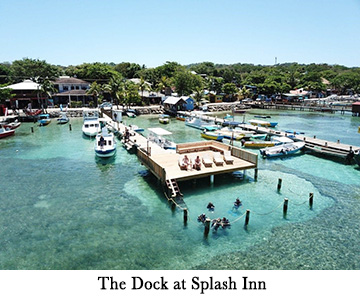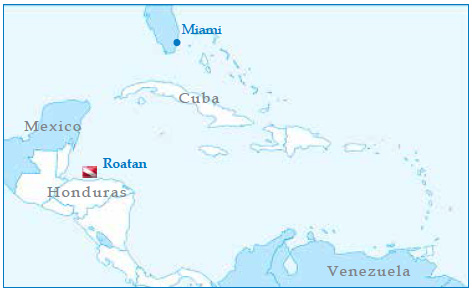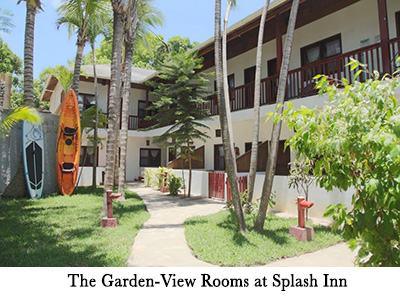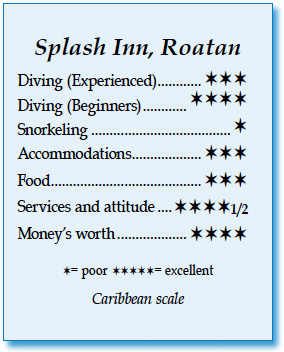Splash Inn Dive Resort, RoatanContents of this Issue: Serious BC Issues: A Mares Recall, and a Major Design Flaw Red Tide Is Gone, But Here Is Florida’s New Coastal Threat Splash Inn Dive Resort, Roatan Send Your Reader Reports (And Tell Us About Plastic Use) Why You Had Better Confirm Your Flight Itinerary Technical Diving: Is It For You? The “Canaries of the Reef” Are in Trouble Sidemount Diving: Take that Weight off Your Back Lessons from My Wife’s Snorkeling Death Maybe This Is the Reason Why His Wife Drowned Old Dive Computers, Odd Treatment: Letters to the Editor A Catastrophic Regulator Failure Editorial Office: Ben Davison Publisher and Editor Undercurrent 3020 Bridgeway, Suite 102 Sausalito, CA 94965 budget diving that’s best for beginners from the April, 2019 issue of Undercurrent
Dear Fellow Diver: The Avianca flight from San Francisco to San Salvador left at zero dark thirty, so I caught a few winks before landing and the subsequent flight to Roatan, which arrived at noon. Not many resorts let red-eye flyers plop right into the water, but two hours later, a few other members of my Northern California dive club and I were off for the first dive.
Roatan's West End, no serene tropical paradise, is home to many bars, restaurants, and lodgings, such as the Splash Inn Dive Resort. Despite the name, it has no beach or pool; it's a modest hotel with a waterfront restaurant and dive shop across the busy main thoroughfare that bustles with scooters, lorries, taxis, carts, buses, pedestrians, tourists and dogs. Crossing the street was a death-defying experience that cried out for a crossing guard. Nonetheless, at roughly $160 a day for bed, breakfast and three daily boat dives, I was happy to put up with clean, basic accommodations and the roadside "attractions." I started each day with a dash through the traffic to the restaurant for a cup of excellent Honduran coffee and an abundant breakfast smorgasbord of hot food platters with tropical fruit and cereals, all prepared with the American traveler in mind -- expect no exotic food here. While the first dive was at 9 a.m., anyone who had celebrated too much the previous night could catch breakfast as late as 10 a.m. and make the 11 a.m. dive. One morning, we headed to the Aguila wreck, 94 feet down to the deck, which is too new to harbor significant marine life. While diving wasn't much, we went there a second time, as, for some reason, it's one of the more popular dive sites. Why? Beats me. A half-dozen dive boats vied for the buoy; it was a mob scene down below. However, the guides saved the dive by leading us to Mike's Place, where life abounded. Cleaner wrasse were having a great time forming a ball and pushing out eggs and sperm in a mating dance. I spotted an unusual warty nudibranch, and enough was happening to make it worth a second dive. With so many dive operations on Roatan, the dive operators must self-regulate -- for one thing, they should reduce the number of boats on the same reefs. Thankfully, officials of the Roatan Marine Park, where all diving is done, have stepped in to save their reefs from more serious decline. There were many barren areas amongst the coral cover, so I was not certain whether I was seeing a reef in slow recovery or in slow decline. But thanks to their conservation measures, one morning dive at Black Rock revealed considerably more coral than other spots, including brain and elkhorn. Ubiquitous parrotfish munched on the abundant coral, blue tangs schooled in the shallows, and a spotted eagle ray swam by. With sites never distant -- morning ones maybe 20 minutes, others five minutes or so --it's one tank at a time, after which we returned to the dock for a short break, without even time after the 9 a.m. dive to remove wetsuits -- then back out. To keep the schedule, our divemaster Chayanne, who was good at spotting critters, always said, "60-minute time limit, 70-foot maximum depth, and keep the wall on your left, or on your right." So much for the dive briefing. While the waters were benign, one was expected to dive with the group, but my buddy and I proceeded at our own leisurely pace at a distance, often exceeding the time. Divemasters Chris, a Chilean who ran the shop, and Marielle, an American, didn't pay much heed to our extended time, but Luca, an otherwise good-natured Italian, harassed us if we didn't proceed apace. Because our club was so large, more than one divemaster often shepherded the group.
During the dive from Black Rock to West End Wall, I saw an arrow crab, some neck crabs perched as usual on the sea whips, and a Pedersen shrimp. Although we saw invasive lionfish, Chayanne often went out with a spear and took them as we dove, feeding them to a shark or an eel. I dived three tanks a day, which meant little time for lunch between the 11 a.m. and 2 p.m. dives. While the crew had lunch waiting for them when the boat docked, I either skipped a meal and took an early dinner or went next door to the restaurant above Reef Divers for a quick noodle bowl. Sometimes I wish I had skipped the closeto- shore third dive and enjoyed lunch. Most close sites -- like Moonlight, for example -- were not worth writing about. (Keep in mind, if you're a newbie, you might find much to like; it's just that I've been around too long.) Because only breakfast was part of the package, dinner could be any of several restaurants. My group often supped at Splash's restaurant, where the meals were satisfying (I went for pasta or pizza) and the service good. Or I walked down the road to Ginger's, which had the nicest bar on the strip, and good tacos to boot. But why is it that so many divers order for dinner the precise species they saw on the reefs that afternoon, while at the same time showing disappointment that the reefs are barren of bigger fish? Where do they think that grouper comes from? Or the snapper, the lobster, the ubiquitous whitefish? Why not just eat the invasive lionfish? One day I skipped the 2 p.m. dive for the night dive, so I enjoyed a leisurely lunch upstairs at Calelu's, enjoying their remarkable tacos and a water view. Afterward, while wandering around town, I realized I had failed to bathe myself in DEET. Before leaving for Roatan, friends warned me of hordes of no-see-ums, sand flies and mosquitoes. Even my doctor had noted that Roatan was a hotbed of malaria, and insisted I take Malarone. However, I did not see a single mosquito or get bitten by any bug, though I felt nauseous from the prophylaxis. Next time I'll skip the Malarone.
I must add that I also took Splash's night dive, literally a yawn, and interesting only in that the full moon was so bright I hardly used my dive light. Splash also offered a shark dive, which I declined; having done my share, I'm not a fan of shark chumming. Those who did attend enjoyed it. Splash Inn Dive shop is well-organized but not fancy. They loaded our gear into the boat and hauled it off. Divers wash and hang their wetsuits, but staff washes the other gear, and each diver stows his stuff in an assigned locker. The hard-working folks at the dive shop, which Chris managed well, handled our large dive club with aplomb and skill. A few inexperienced divers needed extra help or attention, and they got it. We dived from the Toyita, a 30-foot tub featuring dual Mercury outboards to propel 15-plus divers and guides to the sites. At first, they split us up, using their fast skiff for half of our group, but later decided we were too raucous to mix with the other clientele. (Clubs are usually that way, and when I go diving elsewhere and a club shows up, I usually head the other way.) Once the Toyita built a head of steam, the stern wading pool drained, and the ride was fine, though we speculated that the Toyita may soon be Roatan's next wreck dive. One could climb into the boat via the port dive ladder; some folks removed their BCs in the water, which Captain Moreno hoisted aboard.
Though we were out all day, the dive crew did not feed us lunch, the extra fees notwithstanding. Famished, I headed to the Argentinian Grill half a mile down the road for a good veggie stir-fry. My fellow omnivores love the prime rib, but others sent the skirt steak and the fish back to the kitchen. Despite the Splash Inn being in the center of town, my room was surprisingly quiet. A light sleeper, I'm usually disturbed by noise, but I slept like a baby, not 50 feet from the main beachside road. My "deluxe" room, with no view at all, was clean, comfortable and basic, with two queen beds and a small patio with a nice hammock. I had plenty of closet space, but the chest of drawers smelled of mildew, and the lighting was so poor that I could not have read at night were it not for my backlit kindle. Nonetheless, the efficient cleaning staff had my room spic and span when I returned from my morning dives, no matter how messy I was. The staff, too, was always helpful. After I bought a postcard to mail to my granddaughter, I learned stamps were only available across the island at the post office, but Darrel, the front desk man, kindly offered to mail the card for me on his day off. (I should add that Splash offers other housing options; some of our club stayed in villas in a gated community about a 10-minute walk from the dive shop.) As a well-traveled and experienced diver, I wouldn't head out to the Splash Inn with just a buddy. It worked well for my dive club and is a good choice for experienced divers and those on a budget. But, it's simple aquarium diving with few surprises or challenges; perfect for many, less so for others. That said, if my club returns, I'll surely tag along, since diving with good friends made for a nice trip. -- M.C. Our Undercover Diver's Bio: "Having been an active diver for 40 years, I've spent a lot of money on dive gear and dive trips, and the rest I wasted. I love to dive in the rich waters of the Coral Triangle, but nothing beats the ease of flying within my time zone and diving on the same day. Much as I enjoy 80-degree tropical water, I'm getting my drysuit ready for some cold water dives off the California coast."
|

I want to get all the stories! Tell me how I can become an Undercurrent Online Member and get online access to all the articles of Undercurrent as well as thousands of first hand reports on dive operations world-wide
| Home | Online Members Area | My Account |
Login
|
Join
|
| Travel Index |
Dive Resort & Liveaboard Reviews
|
Featured Reports
|
Recent
Issues
|
Back Issues
|
|
Dive Gear
Index
|
Health/Safety Index
|
Environment & Misc.
Index
|
Seasonal Planner
|
Blogs
|
Free Articles
|
Book Picks
|
News
|
|
Special Offers
|
RSS
|
FAQ
|
About Us
|
Contact Us
|
Links
|
3020 Bridgeway, Ste 102, Sausalito, Ca 94965
All rights reserved.

 While motoring out to the reef, I asked the captain, "How long to the dive
site?" "A couple of minutes," he said. I laughed, but sure enough, two minutes
later we were there. I dived in 81-degree water among finger and lettuce coral, with
the usual blue chromis, grunts and tangs. While the reef looks a bit worn, I was
delighted to be back in the 85-degree tropical weather after a rainy winter. Later,
with a cold drink in hand at the Splash Inn dockside restaurant, I watched a stunning
tropical sunset. A nice way to get started.
While motoring out to the reef, I asked the captain, "How long to the dive
site?" "A couple of minutes," he said. I laughed, but sure enough, two minutes
later we were there. I dived in 81-degree water among finger and lettuce coral, with
the usual blue chromis, grunts and tangs. While the reef looks a bit worn, I was
delighted to be back in the 85-degree tropical weather after a rainy winter. Later,
with a cold drink in hand at the Splash Inn dockside restaurant, I watched a stunning
tropical sunset. A nice way to get started. We dove Fish Den and West End one morning, everybody's favorite dives. Although
I generally thought the diving farther away was better, close-in Fish Den debunked my
theory. The dive crossed many shallow gullies, where grouper and big snapper swam, as
it dropped into deeper water. Cleaner wrasse scrubbed away at grouper and triggerfish
with gusto. Morays swam openly among the fans and sea whips, where endless juvenile
filefish hid. Up close, I watched a purple Pedersen cleaner shrimp, a group of arrow
crabs in a giant sponge, and a grumpy stonefish.
We dove Fish Den and West End one morning, everybody's favorite dives. Although
I generally thought the diving farther away was better, close-in Fish Den debunked my
theory. The dive crossed many shallow gullies, where grouper and big snapper swam, as
it dropped into deeper water. Cleaner wrasse scrubbed away at grouper and triggerfish
with gusto. Morays swam openly among the fans and sea whips, where endless juvenile
filefish hid. Up close, I watched a purple Pedersen cleaner shrimp, a group of arrow
crabs in a giant sponge, and a grumpy stonefish. Even though Roatan waters are bereft of big fish (well, I did see a few nurse
sharks and eaglerays), that changed for me when I went next door and joined Reef
Divers for their blackwater night dive. At dusk, we headed out to where deep waters
ran down to 5,000 feet. After night fell, the 45-foot dive boat drifted in the current
while the crew dropped six heavily weighted 40-foot lines around the boat. After
hooking my 10-foot tether onto my weighted lines,
I could slide up and down the length, dropping as
deep as 50 feet. As soon as I switched on my light,
I spotted an agitated juvenile silky shark swimming
excitedly back and forth. He bumped my fin tip,
and I flipped on my GoPro quickly enough to capture
a good video. After that, things calmed down, with
no more big fish, but the current carried endless
phosphorescent planktonic jellies and siphonophores
coming up from the deep on their nightly commute, as
well as comb jellies displaying their vibrant colors.
Even though Roatan waters are bereft of big fish (well, I did see a few nurse
sharks and eaglerays), that changed for me when I went next door and joined Reef
Divers for their blackwater night dive. At dusk, we headed out to where deep waters
ran down to 5,000 feet. After night fell, the 45-foot dive boat drifted in the current
while the crew dropped six heavily weighted 40-foot lines around the boat. After
hooking my 10-foot tether onto my weighted lines,
I could slide up and down the length, dropping as
deep as 50 feet. As soon as I switched on my light,
I spotted an agitated juvenile silky shark swimming
excitedly back and forth. He bumped my fin tip,
and I flipped on my GoPro quickly enough to capture
a good video. After that, things calmed down, with
no more big fish, but the current carried endless
phosphorescent planktonic jellies and siphonophores
coming up from the deep on their nightly commute, as
well as comb jellies displaying their vibrant colors. Tiring of aquarium diving, our group requested better diving away from the West
End, so Chris suggested an all-day excursion for $120. We motored an hour east,
past Anthony's Key to Star Struck, and dived down to a swim-thru at 100 feet, which
turned out to have terrible visibility and nothing to commend it. We then motored
to Gully's Galore, and the divemaster spotted dolphins, so we jumped in to get good
video as they swam past. At Gully's, I dived through coral-encrusted canyons dense
with sea whips and fans. Schools of yellowtail grunt swam with me, and I spotted
huge channel clinging crabs, some 18 inches across, with giant claws. At the end, a
gorgeous pinnacle teaming with pretty angel and butterflyfish concluded a fine dive.
Tiring of aquarium diving, our group requested better diving away from the West
End, so Chris suggested an all-day excursion for $120. We motored an hour east,
past Anthony's Key to Star Struck, and dived down to a swim-thru at 100 feet, which
turned out to have terrible visibility and nothing to commend it. We then motored
to Gully's Galore, and the divemaster spotted dolphins, so we jumped in to get good
video as they swam past. At Gully's, I dived through coral-encrusted canyons dense
with sea whips and fans. Schools of yellowtail grunt swam with me, and I spotted
huge channel clinging crabs, some 18 inches across, with giant claws. At the end, a
gorgeous pinnacle teaming with pretty angel and butterflyfish concluded a fine dive. Divers Compass:The shop offers a full complement of relatively new
rental gear and a wide range of PADI courses; one of our fellow
travelers was certified during our stay . . . A week with 15 dives,
double occupancy, starts under $1,000; nitrox cost me $200 for 25
dives over my 10-day stay . . . there is no snorkeling off the front
of the dive shop, and those who went out on the dive boat to snorkel
found the reef too deep at 40 feet . . . English is spoken everywhere
and the currency is essentially U.S. dollars . . . Customs and immigration
in and out were a breeze. . . .given the resort caters to basic divers, there
isn't much support for serious photographers . . . locals are making jewelry from
lionfish spines; any way one can increase the market value of those fish helps eliminate
them . . . Website -
Divers Compass:The shop offers a full complement of relatively new
rental gear and a wide range of PADI courses; one of our fellow
travelers was certified during our stay . . . A week with 15 dives,
double occupancy, starts under $1,000; nitrox cost me $200 for 25
dives over my 10-day stay . . . there is no snorkeling off the front
of the dive shop, and those who went out on the dive boat to snorkel
found the reef too deep at 40 feet . . . English is spoken everywhere
and the currency is essentially U.S. dollars . . . Customs and immigration
in and out were a breeze. . . .given the resort caters to basic divers, there
isn't much support for serious photographers . . . locals are making jewelry from
lionfish spines; any way one can increase the market value of those fish helps eliminate
them . . . Website - 